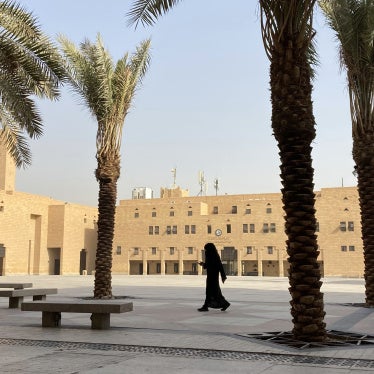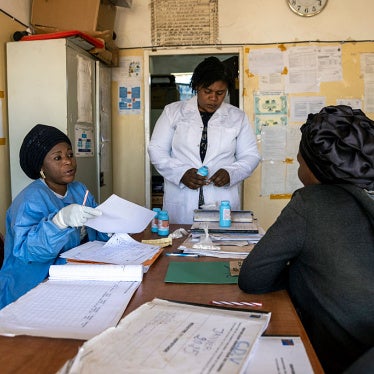(Rabat) – The prison sentence issued on July 1, 2014, for the outspoken rapper known as “Al-Haqed” raises concerns that Moroccan courts have once again convicted him because of his political message. A Casablanca Court of First Instance sentenced Al-Haqed (“the sullen one”), whose real name is Mouad Belghouat, to four months in prison and ordered him to pay a fine and damages for allegedly being inebriated in public and assaulting and insulting policemen.
The trial judge refused all of the defense’s motions to summon witnesses, the alleged victims, or the doctor who signed the medical report upon examining them. This refusal was among the reasons the defense team walked out of the trial at the June 24 session, protesting what they considered violations of the defendant’s right to a fair trial.
“This wouldn’t be the first time that what looks like an unfair trial on common criminal charges has served to silence a persistent critic in Morocco,” said Sarah Leah Whitson, Middle East and North Africa director at Human Rights Watch. “Any appeals trial should fairly weigh all the evidence in the case, and hear all relevant witnesses.”
Police arrested Belghouat, a 26-year-old resident of Casablanca, on May 18, near a soccer stadium, on an accusation of public drunkenness, hitting policemen, and illegally selling tickets to a match – a charge that the court reportedly dropped. Belghouat remained in pretrial detention and is currently in Ain Bourja prison in Casablanca.
Belghouat denied all the charges at his trial and said that a policeman had assaulted him, rather than the other way around. The case file included a medical report on the police agent who the rapper allegedly injured.
The file also included a statement that Belghouat purportedly gave to the police. However, the defendant told his lawyers that while in police custody he had refused to answer any of their questions or sign the statement attributed to him, a person close to the case told Human Rights Watch.
The court has yet to issue its written judgment, which may clarify how it weighed the evidence in reaching its verdict. Belghouat’s lawyers have said they are considering an appeal. In addition to the prison term, the court ordered the defendant to pay 10,000 Moroccan dirhams (US$1,200) and 5,000 dirhams ($600) respectively to the two policemen “victims,” and a fine of 500 dirhams ($60).
Belghouat is closely associated with the February 20 Youth Movement, which has held street protests in Morocco since that date in 2011 denouncing corruption, urging the release of political prisoners, and making other demands.
Authorities have tolerated many demonstrations by the February 20 movement, but also targeted its activists for repression. A Casablanca court on May 22 sentenced nine activists to prison for allegedly assaulting police during a demonstration on April 6, 2014 in Casablanca, even though the court was presented with no evidence identifying the defendants as having attacked police other than their confessions, which they all repudiated in court. The young men are provisionally free while they appeal.
Belghouat served a one-year prison term in 2012-2013 for a YouTube video set to one of his songs, “Kilab ed-Dowla” (Dogs of the State), which the court deemed insulting to the police. Another theme of his music is the gap between rich and poor in Morocco.
Authorities first arrested Belghouat in September 2011 and charged him with assaulting a pro-government protester in a street altercation. His trial in Casablanca attracted crowds of supporters, who claimed that the case was a set-up. The defense team contended that there were many inconsistencies in the account provided by Belghouat’s alleged victim. In January 2012, the court convicted Belghouat, sentenced him to the four months he had already served in pretrial detention, and released him. Three months later they re-arrested him for the YouTube video set to his rap song about the police.
On February 13, 2014, police prevented a Casablanca bookstore from hosting a news conference at which Belghouat was to have presented his new album, “Waloo” (Moroccan dialect for “Nothing”). Authorities informed the al-Karama bookstore that it needed to notify them in advance of the event, even though the shop had hosted numerous book events in the past without first notifying the authorities.
“Morocco hosts international music festivals every spring, summer, and fall, but can’t seem to tolerate the troubadour of its own February 20 movement,” Whitson said.







